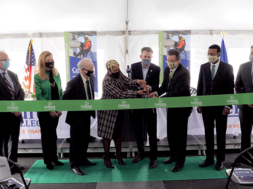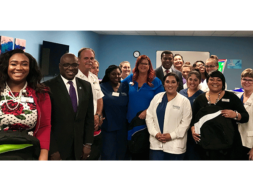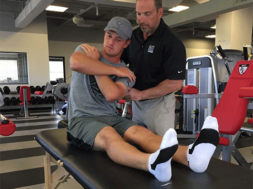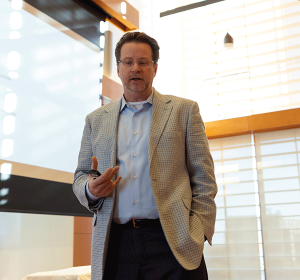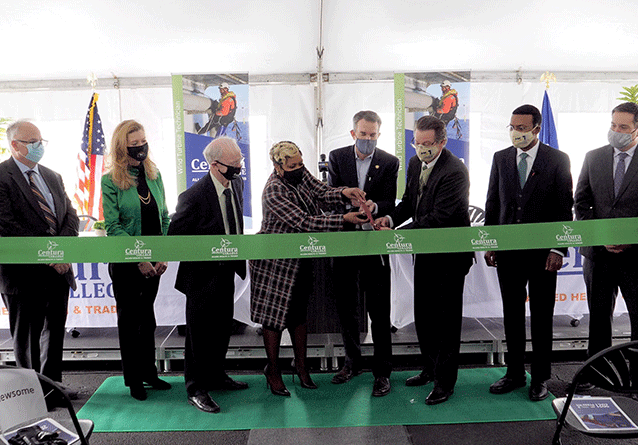
Written from an interview with Joel A. English, Executive Vice President and Kenneth Cooper Alexander, Chancellor, Centura College, Aviation Institute of Maintenance, Tidewater Tech
Centura College realized a little wind could mean a lot of opportunities for its students. So it’s no surprise their wind turbine maintenance program is quickly gaining velocity — pun intended — as wind turbines become an increasingly popular way to generate energy.
Joel English, executive vice president of Centura, as well as the Aviation Institute of Maintenance and Tidewater Tech, credits Michael Lanouette for their new program.
Centura hired Lanouette about 3½ years ago to look at renewable energy and cutting edge new programs for tomorrow. One of the first programs Lanouette initiated was a construction electrician program to go along with its welding, HVAC and other skilled trade occupations. Next, he turned his attention to renewable energy.
English said they already had two courses in renewable energy embedded in their electrician program.
“We’re focused on solar and wind as renewable energies, and then also LED lighting and … green energies, but this was really a call to take part in our community’s growth of renewable energy,” he said. “I had to ask a question that career schools have to ask, and that is, ‘Are the jobs ready for this?’”
It became apparent they were ready, as at about the same time, the state announced it would be building offshore wind farms in the Mid-Atlantic region, including 188 wind turbines off the coast of Virginia and another 200 off the coast of North Carolina.
“That told us the place and the jobs are going to be here,” English said. Centura decided to use parts of its construction electrician program, which is nine courses over 12 months, as a start, and modify that program for offshore wind energy. They used the first four courses of the construction electrician program as the core energy program, and replace the six upper-level courses with wind energy and wind turbine courses.
“There’s this core curriculum of energy and transfer,” English said. “And then the upper electives are for wind energy.”
That same philosophy will help them as they look to expand into other renewable energy programs, such as solar energy, he said.
“As solar panels become more commonplace both in homes and businesses, we’ll do the exact same thing where there’s a core electricity transfer and energy program with … advanced courses in solar,” English said.
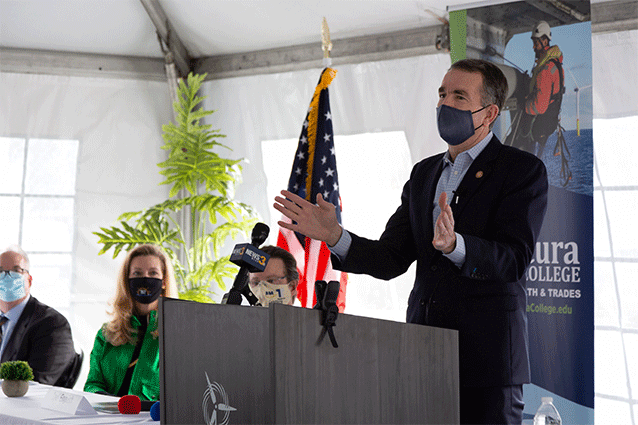
Centura’s Solar Technician program will offer industry-recognized certifications and competencies, so graduates learn beyond the standard installation building, and can repair, wire and service the actual solar array, added Kenneth Alexander, new chancellor of Centura, AIM and Tidewater Tech.
After that, they plan to start an electric vehicle technician program at Tidewater Tech, with those same four courses transferring over to the new program. Alexander said their vehicle technician program will focus on understanding lithium batteries and various battery compositions.
“As a strategic mission, I plan for Centura College and Tidewater Tech to be the leaders in renewable energy education over the next decade,” English said. “I would foresee that by 2031, 10 years from now, community colleges will probably catch up and (these types of programs will) become commonplace. That’s great, but I know that industry cannot wait a decade for this kind of education, so we’re putting these programs together now to make sure that the workforce has what it needs.”
English said he doesn’t know of any other career schools offering programs in renewable energy sources. “But I know there are only two programs for accredited offshore wind turbine technology programs in America: ours, and one private school in Maine. But there’s plenty of room in this business, and I welcome folks to join up.”
Centura College has a full workable scaled-down version of one of the offshore turbines, allowing their students to work on a turbine before they are deployed on a barge offshore, Alexander said.
“So when they graduate and go … work on a turbine offshore, not only will they have the competencies as it relates to instruction, but they will also have the hands-on experience.”
He said two different prototypes of turbines are already built and working. All are permanent turbines and fully constructed off the coast of Virginia Beach.
“In this curriculum, not only are our students learning about the parts and the gears, and the motors, rotors and blades, but they’re also cabling,” Alexander said. “The electrician construction program is a vital component of the turbine maintenance program — even the staging and the housing of all of the gears, motors, rotors and parts. Our technicians will have the hands-on competencies working with those parts and those components before they graduate and go to work offshore.”
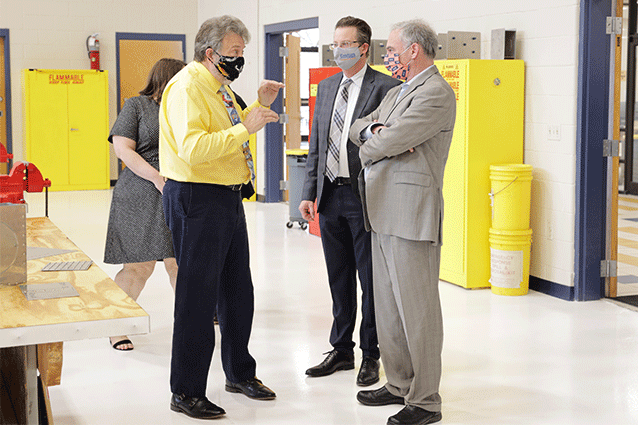
What’s great for the cities of Norfolk and Virginia Beach is all the industry that will surround the wind turbine project, English said, including a hotel that will be built offshore to house some of the workers who will be staying there for long periods of time.
It’s not unusual to have housing built on a floating barge in that area because of all the shipyards and ship repairs being done, Alexander added.
English said it is essential that their students have an authentic experience as they work on turbines.
“Inside our school right now, we have a number of wind turbines and wind tunnels, and (we are using) the technology that actually creates energy transfer from wind to battery, and to storage and to usage,” he said. “But what we’re working on right now is the large unit that will be outside.”
English said that will include not only a wind turbine, but also a climbing tower.
“Part of our program is the safety and strategies behind climbing and roping,” he said. “Not only going up and down on the turbines, which are hundreds of feet in the air, but also doing the transfer. And one of the most important and dangerous parts of this job is transferring from the transportation vessel that brought you out to the turbine, to the platforms on which you work on the turbine.”
He said the reason people see so many structures on their campus is because students will need to have a lot of practice making that transfer from vessel to turbine. And if they find out that they’re not cut out for working at such a great height, they need to find that out when they’re still in school, and not on the job, English said.
Students will also be able to discover if they can handle the “sea” thanks to simulation labs, Alexander said.
“Part of the experience is to have those students experience (the sea in) a simulation lab, as well as the climbing tower and the working on the model that will be present outside of the facility,” Alexander said. “We’re going to ensure safety first before they go from a vessel 27 miles off the coast to the actual turbine.”
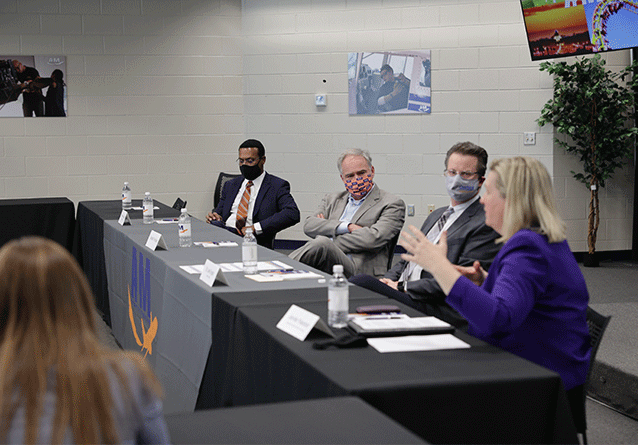
Like some of it is other programs, the wind technician program will include nine courses within a 12-month period, English said, and in each course, students will work toward an industry-recognized certification. In other words, students will earn nine certifications by completing their program.
“That sounds like a lot of certifications and it is, but we modeled it after our Automotive Technology program,” English said, adding that their automotive technology students gain ASE certifications in brakes, electronics, frame and so on.
“We wanted to do the same thing with the wind turbine program,” he said. Students will be OSHA certified in safety, as well as receive Global Wind Organization and Coast Guard Safety certifications.
The Coast Guard safety training will be done at a partner school, Mid-Atlantic Maritime Academy, which is now a satellite location of their school, English said, and about 1 mile away from their Centura campus.
The wind turbine program started in January, so their first graduates will finish in January 2022. English said he is already proud of their soon-to-be graduates and what Centura has been able to start.
“For us to be able to present Dominion Energy and the other companies around this industry with people who have gone through a program with nine certifications, it’s almost like military personnel with ribbons and badges down their chests,” he said. “There is no school that has this much dedication to the certifications.”
English said the last certification that they plan to include is for endangered species.
“We want every person working who comes from our school to be able to recognize the endangered species that they are close to … and to be aware of the kind of wildlife that deserves protecting.”
He said it’s the responsible thing to convert energy from fossil fuels to green energy.
“But as we do that, we also have to be kind to the Earth creatures right here in front of us,” English said. “And so we hired a Ph.D. in entomology and environmental science to write a course specially designed for the Chesapeake Bay and the Mid-Atlantic area offshore environment.
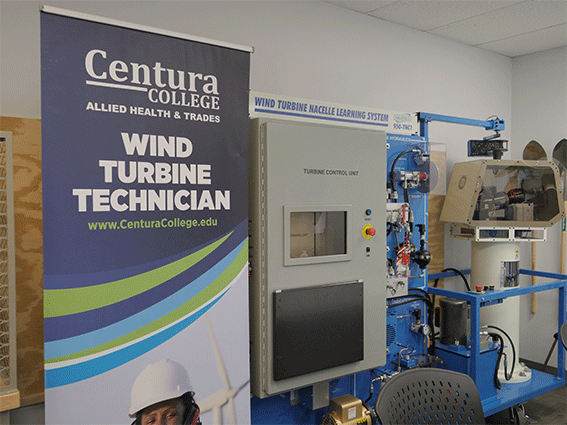
“This seven-module course may be an internal certification, but it is an incredibly beautiful course that, one by one, takes a look at sea mammals, fish and swimming creatures, aquatic creatures, the actual sea floor bottom wildlife, the birds, the bats, all of the creatures that are endangered or close to endangered, so that they can be recognized and cared for.”
Alexander said Centura is taking renewable energy to the next level in career and technical education. “We’re not going to claim that we’re the only one in this space, but we’re going to be the best one in this space.”
Finding students for these new renewable energy programs hasn’t been difficult, particularly since their wind turbine technician program is one of the lowest cost programs they have.
“It’s the right thing at the right time,” English said. “If you came down to Southeastern Virginia, you would not be able to spend the day and not see on TV or hear on the radio something about wind turbines. It is going to revolutionize the workforce space here. That has meant we really haven’t had to advertise for each of the three starts of students we’ve had in the wind turbine program thus far because people know, ‘Hey, this is the future in this area…’”
This is the second article in a three-part series. The final article will focus on political outreach and community engagement.
JOEL ENGLISH is the Executive Vice President of Centura College, Aviation Institute of Maintenance, and Tidewater Tech, where he supervises all operations over the 19 campuses across the country. Dr. English served as a Commissioner for the Accrediting Commission of Career Schools and Colleges (ACCSC) for six years, serving as the Chair for two years, as well as chairing the Distance Education Committee. In previous positions, Dr. English served as the CEO for the Ohio Centers for Broadcasting, Illinois Centers for Broadcasting, and Miami Media School, a family of schools dedicated to technical education in radio, television, and internet media broadcasting. He also oversaw distance learning and school operations at several campuses as a Regional Director and Executive Director at Centura College, and he was formerly an Assistant Professor of English and Distance Learning at Old Dominion University. Dr. English published Plugged In: Succeeding as an Online Learner through Wadsworth/Cengage Learning, as an extension of his dedication to supporting student success within online courses and programs. Dr. English holds a Ph.D. in Rhetoric and Composition from Ball State University, and an M.A. and B.A. in Technical and Expository Writing from the University of Arkansas at Little Rock.
Contact Information: Dr. Joel A. English // Executive Vice President // Centura College, Aviation Institute of Maintenance, Tidewater Tech // 757-456-5065 // jenglish@centura.edu
KENNETH COOPER ALEXANDER serves as Chancellor for Centura College and Aviation Institute of Maintenance where he oversees policy development and provides direction for its institutional mission, core, values and vision while leading external affairs for nineteen campuses across the county.
He was elected Mayor of the City of Norfolk in 2016 and reelected for a second term in 2020. A native of Norfolk and also president of Metropolitan Funeral Service, he began his public service career more than two decades ago. Before his election as mayor, Dr. Alexander served in The Senate of Virginia where he was a member of the committees on Commerce and Labor, Finance, Transportation and Privileges and Elections.
Before his election to the Senate, he represented the 89th District in the House of Delegates from 2002 until 2012, serving on the committees of Commerce and Labor, Education, Privileges and Elections and Rules. He is a member of the Greater Norfolk Corporation and an alumnus of the Sorensen Institute for Political Leadership. Dr. Alexander began his community service as president of Berkley’s Beacon Light Civic League and Beacon Light Community Development Corporation.
A 1985 graduate of Lake Taylor High School, Dr. Alexander holds a bachelor’s degree in Political Science from Old Dominion University and a master’s degree in Diplomacy from Norwich University, and a doctorate in Leadership and Change with Antioch University. He has served as a lecturer in International Relations, and the focus of his studies and research includes: Servant Leadership and Community Organizations, the Politics of Higher Education, and Political Citizenship in Representative Democracies. His first book, Persistence: Evelyn Butts and the Fight for the Rights of a People is scheduled for release on May 31, 2021.
Dr. Alexander and his wife, Donna Burnley Alexander, have two school-aged sons, Kenneth II and David.
Contact Information: Kenneth Cooper Alexander // Chancellor // Centura College, Aviation Institute of Maintenance, Tidewater Tech
